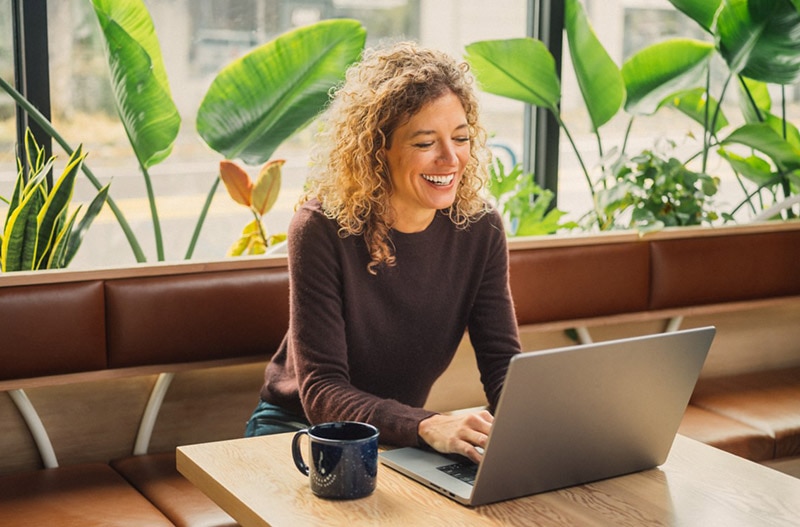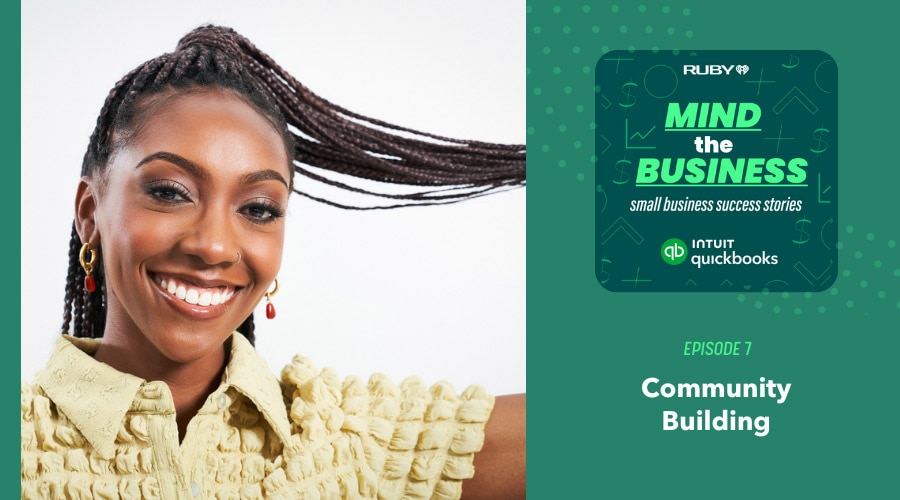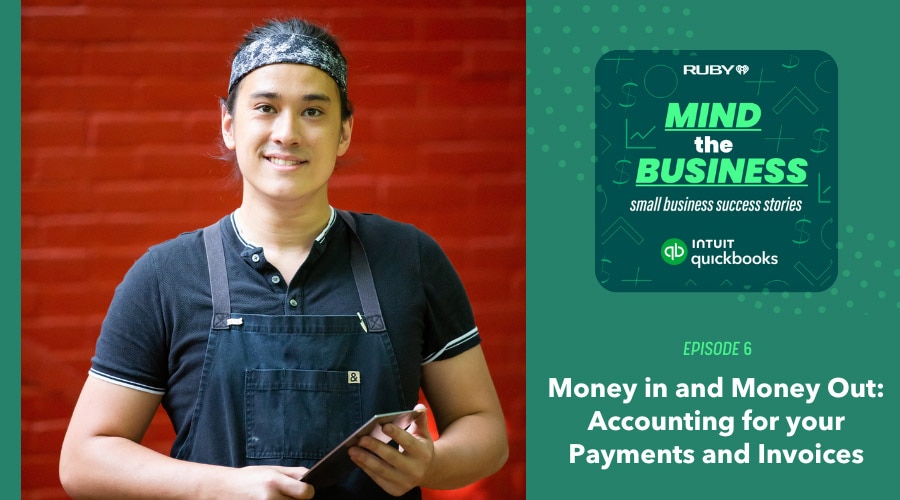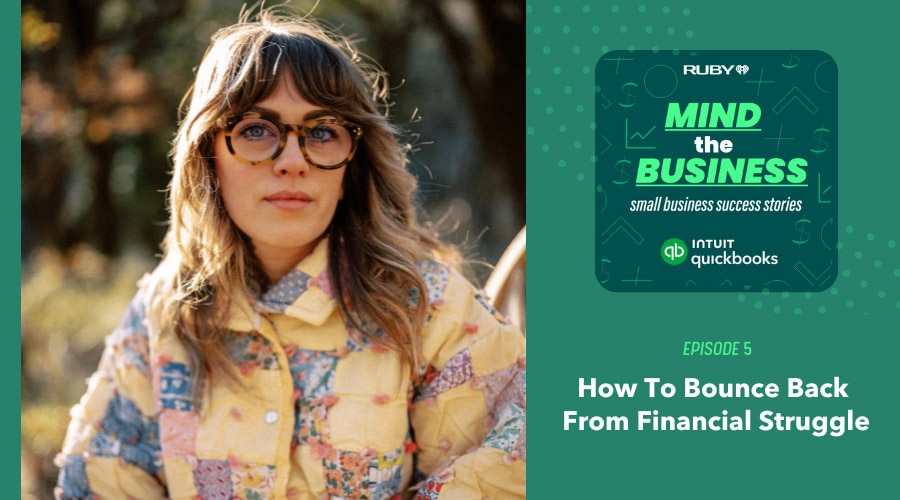Owning a small business can be one of the most rewarding and challenging things a person does. Amid an uncertain economy and ever-evolving consumer trends, there is a lot to figure out and navigate to ensure your business thrives. Join hosts Jannese Torres (Yo Quiero Dinero) and Austin Hankwitz (Rate of Return) as they connect with small business owners and hear their stories about managing the ups and downs of starting and growing a small business. Listen and learn valuable lessons from their experiences that will guide you along the way through your own small business journey.
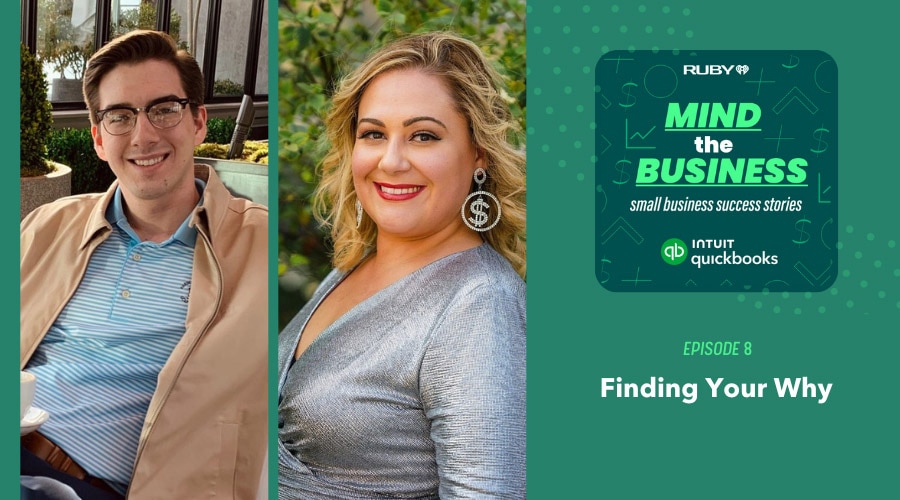
Finding your why
Austin Hankwitz: In every episode so far, we’ve talked with small business owners as they shared their stories about the ups and downs of owning a small business. But today we're gonna do something a little different.
Jannese Torres: Our incredible guests have dropped so many gems over the last seven episodes so far. Our final episode, Austin and I are gonna reflect back on all of those conversations and we're gonna tell you our own stories.
Austin: For this last episode, we're talking about finding your why, the thing that inspired you to start your own business in the first place and keeps you getting up every day and continuing the dream of self-employment through the successes, the setbacks, and everything in between.
Jannese: I'm really excited for this episode, Austin, because we've heard some great stories so far, and I have a lot to share from going on this amazing journey, and I know you do too.
Austin: Oh, 100%. You know, success when you see it, or you think you do the people in the spotlight. But what about those small business masterminds who succeed at making their money work harder?
Jannese: They do that by having a business bank account with QuickBooks Money, which now earns 5% annual percentage yields making your money work as hard as you do. That's how you business differently.
Hank: I've always thought of myself as an entrepreneur, even since I was in middle school. I remember living in Denver, Colorado…school got canceled one day because we had this crazy blizzard. And instead of sledding and building snowmen with my friends, I decided to borrow my neighbor's snowblower, teamed up with a few kids around the block, and we made $120 that day clearing driveways. I've always had this weird knack for entrepreneurship, getting my hands dirty to make some cash, as well as collaborating with other like-minded individuals to achieve our general goals.
Jannese: I love that. It takes me back to the days where I had a lemonade stand and I also saw the value of having ways of making money that don't rely on a nine to five. Even with my own parents, we used to host yard sales. My dad would find random things in the neighborhood that folks threw out on trash day, do a little refinishing, and sell them for a couple dollars. And now apparently that's a thing called flipping. So I think I had a little bit of a knack for making money on the side ever since I was young.
Austin: I am so excited to dive in. So let's do it. Jannese, kick us off. Why did you take the initial leap into entrepreneurship?
Jannese: So for me, I had kind of a practical reason and more of a philosophical one. I was laid off in 2014, first and only time, and it was a really big wake up call for me because I had been sold this dream, right? This corporate dream where you get a job, you work there for 40 years. You're good. And as a first generation kid, I definitely got the message that that was the key to success.
So when I followed that path and it led me to a position where now all of a sudden this career that I've built has been pulled out from under me — it made me question a lot of that narrative and it made me never wanna be in a position again to have someone be able to disrupt my financial stability. So that was the practical reason.
But also I think I was definitely born with a little bit of a rebel streak as the eldest daughter. My parents were very strict, and so I would find little opportunities to kind of question the status quo — it usually got me in trouble, but I do feel like I just am not really good with having somebody else tell me what to do. And part of my desire to be an entrepreneur was the ability to be my own boss.
Austin: I think a lot of people listening right now would also relate to this sort of like — wait a second — I was told if I do this, if I go to college, if I get the degree, if I work for 30 years or whatever…that I will be happy. I'll be rich, I'll be retired. I'll be A, B, C, X, Y, Z…whatever that means to them. And I had the same sort of wake up call. I realized quickly after graduating college…I felt that I spent a lot of dang money on that and I didn't have the answers I was looking for. Sure, I knew calculus and geography and how many moons were on Jupiter, but I didn't know how to invest in real estate, build my credit score, or start a business.
And so I realized really quickly that I wasn't alone in this realization. And that a lot of Americans, countless Americans, had no idea what the stock market was, how to invest, how to grow their wealth. So since graduating college in 2018, I believe the wealth gap in America has only grown wider, something that I think we all want to help shrink. I want to introduce as many people to the investor class as possible to help do that, right? To not just be these consumers from the Walmarts, the Targets, the Costcos, but also own the companies they consume from. And that's why I started publishing my own personal finance and investing content on the internet.
You don't have to always trade your time for money anymore. You can passively make money through capital appreciation and dividends. Two things that you'll need to know if you ever wanna retire one day.
Jannese: Yeah, absolutely. Having ownership of your time is one of the best things about entrepreneurship. Our first guest on this season, Grace Wells, was adamant about the immediate benefits of being your own boss.
Austin: Being an entrepreneur and having to rely on yourself and your own instruction is really, really important and can be eye-opening for a lot of us. When were your eyes first opened to being an entrepreneur? What were some specific things you did that were like…wait, I can do this. I have what it takes.
Jannese: I love this question because that transition period is something very scary. I never imagined myself being a full-time entrepreneur. So when I decided that I was interested in taking the leap, I chose not to jump out of the plane without a parachute. I took a very strategic approach and I really wanted to prove to myself that I could actually do this.
Part of what I started doing was funneling my paycheck to my 401k and paying myself through the business. So I got on payroll, I was issuing myself a paycheck equivalent to what I was earning as an engineer, and I wanted to do that for at least four to five months in order to really prove to myself that I could walk away and still be able to keep my standard of living.
That might be very conservative for some people. You know, there's a lot of folks who start businesses during a job layoff or a transition, but if you have the opportunity to do this while you're working full time, I think it's a really smart thing to do because you can bulk up your emergency savings. You can invest some money from your paycheck into growing your business and you don't have this immediate need to make a payoff right away. And I wanna remind folks how important it is to understand this is a process. Anybody who has run a business, who has built a business, will tell you it does take time.
I think having the patience and really putting the systems in place to make you able to make that transition safely, and hopefully for the final time, I think it's a good strategic move. I'm curious for you, Austin, when you were deciding to take your content creation career to the next level, what was your process?
Austin: I did a very similar thing. I did not want to jump into entrepreneurship without knowing that there was longevity to it. I was building my business on the side while also working full-time. And I did that for an entire year. So I was working 40, 50, 60 hours a week. And then from 9:00 PM to 1:00 AM I was building my business. I wanted to make sure that I had what it took to completely say I can hang up my W2.
I come from this other side of the spectrum where I really liked my job. I really enjoyed working my W2 job. Sure, I worked pretty hard and I was probably underpaid a little bit. But generally speaking, I've really enjoyed the people I worked with and it was kind of hard to take a step back from that and say, no, I should start my own business and I should double down on entrepreneurship.
And you know, someone I talked to in that process was my dad. A big lesson that I learned as an entrepreneur was, you know, I said, “Hey dad, I've got this thing called TikTok and podcasting and newsletters. And I'm doing stuff on the internet. I'm making way more money doing this than I am with my W2 job. I'm ready to make the transition.”
And he goes, “I have no idea what you just talked about. Why would you give up your job to do things on the internet?” And so, you know, that definitely weighed on me. I really appreciate my dad's perspective and advice, but I ended up, of course, against his advice, quitting my job — which was the best decision ever. But I think a lot of people take the advice from people that aren't qualified to give that advice, and sometimes it’s to the detriment of their futures.
Jannese: I think it's a good reminder that you have to believe in the idea more than anybody else because usually what happens is everyone calls you crazy until you're successful, and then they ask you how you did it.
Austin: One hundred percent. I mean, look at our guest, Michael Behn. He was working insane hours sweating in the kitchens. But he saw a need adjacent to that world that he could fill and be much happier doing. So he started Moshi Moshi knives and never looked back.
Jannese: Yeah. Michael is a great example of why we get into business for ourselves, especially after seeing what it's like working for someone else. Austin, what's your “why” when those hard times show up? Because they will, there will be setbacks and how do you continue going forward when things do get challenging?
Austin: That's a really good question. You know, I think I have two answers to this. The first being, if you lay the foundation right, you work with integrity, compassion, honesty, everything that gives us our uniqueness…Setbacks are gonna be far and few between. Understanding your business and your financials like the back of your hand, is also a really, really great way to identify these red flags and setbacks before they happen, which is something I take very seriously and QuickBooks is the easiest way for me to do that.
But with that being said, the way I'm able to get over setbacks is to surround myself with people who continue to motivate me, educate me, and inspire me to keep going.
I think every content creator, maybe even yourself included, is worried about this potential ban for TikTok. For me that would be pretty bad. I'm certainly a talker, but I'm doing what I can at the moment to own my audience by collecting their email addresses, maybe migrating them to another platform.
And back to what we talked about before, diversifying my revenue streams away from one specific funnel. So I think that by having sort of a bird's eye view, a calm, cool, collected perspective on what this setback might be, and to only remember that you can control the controllables. That's all you can control, right? Things that are absolutely in your hands — and I can't control a potential TikTok ban. So I'm doing the best I can with the cards I'm dealt.
Jannese: I mean, that's all we can do. We kind of just have to roll with the punches. I always tell people that entrepreneurship is the greatest lesson in resilience, and I had a personal story with my own business that really made me grateful for the fact that I am very conservative when it comes to how I set aside money, because you just never know.
I had my first live event last year and I ended up going six figures over the budget when it was all said and done, and that type of situation could make or break a business. But what I have been really good at, and I think this is why I like to call myself a little bit of a money nerd, is I have so many different pools of money. I was able to kind of reallocate where I had saved some investments and cash out that stuff so that I could actually foot the bill and not get into even more debt in order to cover the expenses of this live event. It was a really big teaching moment for me because it was the first time that I had taken on such a big project, made me question if I wanna do it again, but I'm just glad that I had the financials stability and the resiliency in my own business to be able to weather that really unexpected expense.
Austin: More power to you. That really reminds me of our conversation with Taylor. You know, she had this crazy tax bill that came out of the blue. She had to move, she had to do all these crazy big things to overcome that setback and that challenge, and it really just reminds me of how resilient entrepreneurs can be.
You mentioned resiliency. That is so, so important for people listening right now to realize that entrepreneurship isn't always flowers and unicorns and rainbows. It sometimes is a lot of resiliency.
Jannese: Absolutely. As they say, anything worth doing is worth working for. And even through the ups and downs, it's so important for us to celebrate our victories wherever we can. How do you celebrate your victories, Austin?
Austin: How I celebrate victories is, you know, certainly I like to go on vacations. I like to spend time with my family. I like to go out with my friends, But something else I like to do, and I try to do this every single quarter throughout the year, is I reflect upon the last three months and I write down in my journal what I have achieved. And sometimes when I look back to what I had written in this journal, I realize I’ve come so far. And I think a lot of that self-reflection is really important for other people listening right now to do. Because you don't know what you don't know. And I guarantee you in a few years you're gonna be doing stuff that you right now would've never imagined.
Jannese: It's so true. You know, when I think about why it's important for me to celebrate victories, it's because entrepreneurship has given me a real gift, which is the ability to own my time and to celebrate my one year anniversary of becoming a full-time entrepreneur. I actually ended up taking my mom to Paris.
Austin: Oh wow.
Jannese: Yeah. I mean, it was an incredible mother-daughter trip. We've never traveled together before that. So it was an opportunity to make a lot of memories, but especially because she was declared cancer-free a little bit before that. And so for me, it was just a really important milestone for both of us.
Entrepreneurship was at the center of why I was even able to take this trip. You know, I didn't have to request PTO, I didn't have to worry about the budget. I was really able to just be present and make these really, really memorable moments matter. And I think that's the reason why we have to get really good at enjoying those benefits that do come from entrepreneurship because it is so worth it.
Austin: Oh my gosh, Paris. That sounds incredible. I'm so jealous. I've never been, and I'm thrilled for your mom to be cancer-free. Being able to be there for family members when things get challenging is one of the benefits of entrepreneurship that you really just can't put a price on. You can measure profits and overhead and output all day, but the ability to take care of your family, not just financially, but with your time and your physical presence, it's just an immeasurable benefit.
That really reminds me of our conversations with Michael and Daniel Jay, how they're a father and son team who co-founded the t-shirt business Lazy Butt Club. You know, not only did they find a way to work together, but also to make sure that as entrepreneurs, they make time for each other outside of work and prioritize their family. And the same thing for Jordan Rose. She's an Etsy seller and the owner of Fresh Prints of SF. She was very clear about how important owning her time is and how as entrepreneurs, we don't have to ask for PTO.
Jannese: You know, one of the things that, despite entrepreneurship being so fabulous, it does get lonely at times. And so I think that's one of the reasons why it's been really important for me to build community.
I know for somebody who is like a first generation business owner like me, my family still doesn't understand what the heck I do, and so it's been really important for me to create community, find folks who actually get the struggles that we're going through, and it can be very lonely as well, from somebody that works from home. I've had to become very intentional about creating that space where I can ask for help and know who to contact for resources and a community can do more than just give you a hand when you need it. It's a place where we can help out others and even thrive ourselves. Our guest, Ciara Imani May looked around and didn't see any environmentally sustainable options for faux haircare. So she created one herself, and now she's a community leader at the forefront of that entire industry. I'm curious for you, Austin, how has community played a role in your own journey?
Austin: Oh my gosh. Community was major. I mean, to your point, working from home, not being around people, but making all these random friends on the internet, like it feels, wow, I've got all these followers and potential friends and people that care about what I have to say, but it gets really lonely.
I love connecting with new content creators or new small business owners who are really excited to begin their entrepreneurial journey and sharing with them. That to me is what really fires me up.
And building community outside of entrepreneurship can be just as important. I think a lot of entrepreneurs fall victim to hustle culture and always on, always working. It's okay to take a break and go hang out with your friends, or go take your dog for a walk or, you know, get outside and touch grass, right? Entrepreneurship is about owning your time and spending your time the way you want to. If that is connecting with other entrepreneurs and building that side of your community, or connecting with your friends and your existing community outside of work.
Jannese: Absolutely. A big part of how community has helped me is having a pool of people who can give me access to connections and resources that I didn't even know existed. For example, I am coming out with a new book and my book proposal coach, my agent, and so many people that have put this together — we’re a community. I have a mentor who introduced me to a lot of folks who have now been able to be a part of this awesome project. And so I think it's important to foster community because that is how you can potentially find that next tool that's gonna help make success easier for you and your business.
Austin: I couldn't agree more. I really wanna dive deeper into your why. Why do you keep going? Why do you keep doing it?
Jannese: I love the fact that now I get to write my own rules. I am someone who really enjoys the fact that no day looks the same, and I get to live and work in a way more creative zone than I could before. This is the freedom that entrepreneurship gives you. It's really the ability to create a career and really dictate how you spend your time and your energy. Most importantly, it's been that I am my own safety net. As an entrepreneur, I don't have to worry about somebody laying me off. I don't have to worry about not being able to do something because it’s not in the budget.
There's a real power that comes from being able to be your own money printer as a business owner. And I feel like it helps me walk around in the world with a little bit more confidence. I have the ability to create the life that I want. I have the skills to do it. I don't have to decide if I have time for family, if I have time for friends, if I have time to invest in my own health and self-care. There is a real power that comes from entrepreneurship and that really is my why. I get to run things. I am the writer of my script.
Austin: I'm right there with you. I remember commuting an hour each way to work every day. I remember sitting in the kitchen and eating my boxed lunch in silence with my headphones in. I was always on call if my boss needed me. My phone was ringing and that was the same for the weekends, right? Today I have the freedom to spend my days, my evenings and my weekends any way I'd like. I also work from home, which means I save a lot on gas now. The flexibility also gives me an extended amount of time with my dad, who's in his late seventies. I'm his primary caretaker and there's nothing more special to me than being able to run over to my dad's house, make him some lunch, and just make sure he's good for the rest of the day. I also love having him over for dinner.
So to your point, having the flexibility, having that confidence, knowing that you are your own boss, you can write your own script, but also taking that extra time to do something other than just leisure, but also something really meaningful to you, I think is my why and what keeps me going. I love being able to spend time with my family, my friends, and having that extra couple hours a day or several hours a week.
And I totally agree with the confidence side of the equation, talking about how you feel like you can control your own destiny because of your skills. I think that's what's so important about being an entrepreneur is that people's skills never go away. Your tools can go away. Your computer can break. Those can go away. They deteriorate over time, but your knowledge as to how you can do
Jannese: And I think at the end of the day, that's why we all do what we do. It's about the options. It's about freedom. This is what entrepreneurship is all about.
This podcast is a production of iHeartRadio and Intuit QuickBooks. Our executive producer is Molly Sosha, our supervising producer is Nakia Swinton, and our writer is Eric Leeja. Our head of post production is James Foster. QuickBooks Money is a stand alone Intuit offering. Banking services provided by Green Dot Bank, member FDIC. Only funds in envelopes earn annual percentage yield. APY can change at any time. Money Movement Services provided by Intuit Payments, Inc., licensed as a money transmitter by the New York State Department of Financial Services.








